IJCRR - 4(2), January, 2012
Pages: 102-109
Print Article
Download XML Download PDF
LIFESTYLE DISORDERS IN URBAN CHILDREN OF RAJASTHAN: A SURVEY STUDY.
Author: Omendra Pal Singh, Laxmi Singh, Abhimanyu Kumar
Category: Healthcare
Abstract:Over the last decade the pace of advancement in electronic technology has been breathtaking, resulting in quick development in all aspects of life. But dependency and excessive use of electronic technology forced people to adopt unhealthy life style. This unhealthy and inactive lifestyle in turn was adopted by children through their crucial method of learning. Therefore to find out the lifestyle disorders in Indian urban children a self selected survey was conducted by ?given questionnaires method' in year 2009-10. A random sample of 450 children was collected from different elementary and higher secondary schools of Jaipur, Rajasthan to find out the present lifestyle choices of the children and their involvement with various related disorders.
Keywords: Lifestyle disorders in children, lifestyle choices, urban children of Rajasthan.
Full Text:
INTRODUCTION
The numerous discussions and guidelines have been proposed for lifestyle disorders in adults but a little is thought about children in this context. But the fact is that the changed lifestyle choices of adults are in tern adopted by children because it is crucial that we set a positive example for them and they learn by what we do and not by what we say. [1] The aim of present study is to find out the present lifestyle choices of urban children of Rajasthan and their involvement with various related disorders.
MATERIAL AND METHODS
A self selected survey on lifestyle disorders (LSD) in children of different socioeconomic status was conducted by ?given Questionnaires method‘. A random sample of 450 children was collected from different elementary and higher secondary schools of Jaipur, India. The questionnaire was structured covering questions regarding areas like demographic, food habits, sleeping hours, physical activity, behavior, mental status etc.
The questionnaires were distributed to the children in school during child health check-up camps and instructed to get it filled by their parents. On the basis of grading and scoring method the interpretations were made. The mean score of profile was calculated on basis of final score.
OBSERVATION: The findings of the survey on lifestyle disorders in children are tabulated as below:
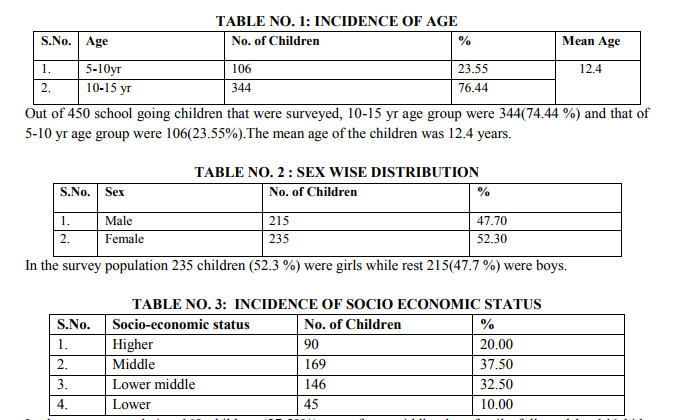
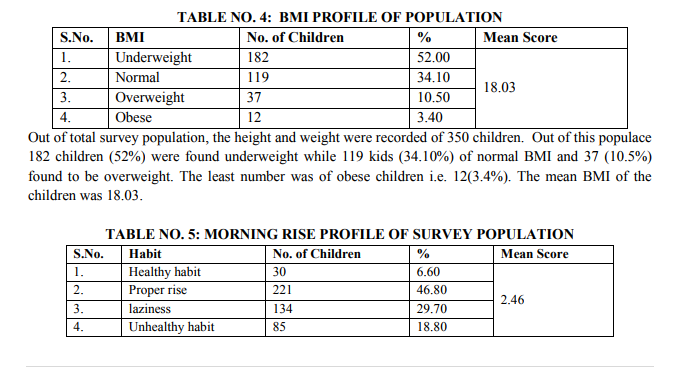
It is clear from the above table that out of total surveyed children, the maximum 221 (46.80%) were having the habit of proper rise. On the other hand 134 kids (29.7%) were lazy to rise in morning and 85 (18.80%) having unhealthy habit of getting up late in morning. Only 30 (6.6%) children had cultivated the healthy habit of early rise in morning. The mean score was 2.46.
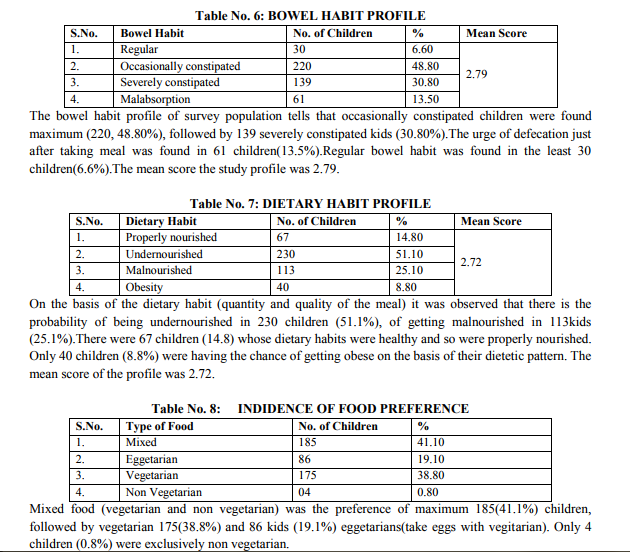

Out of survey populace the majority of the children (226, 50.2 %) prefer pungent and salty taste dominant food articles. Sweet and sour eatables were the preference of 123kids (27.3%).The mean score of taste profile was 2.76.
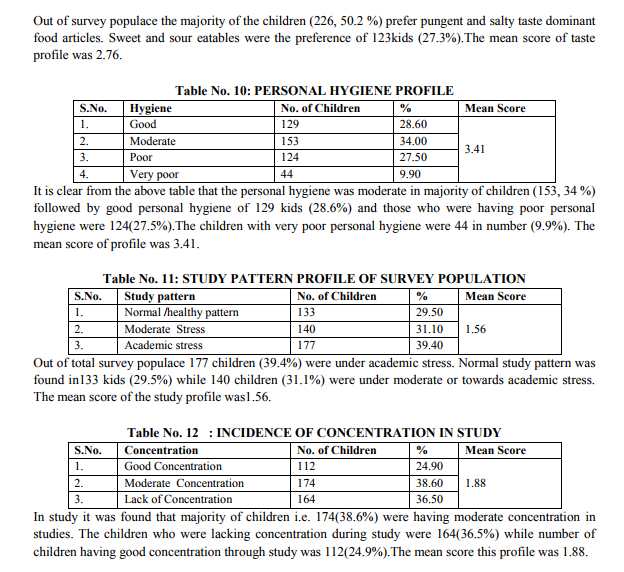

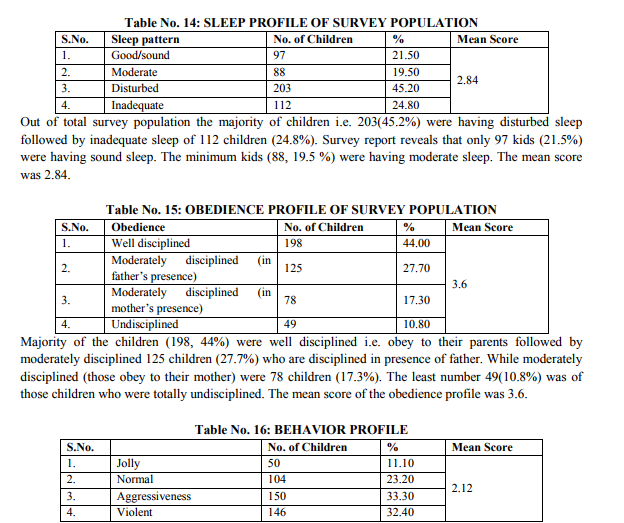

DISCUSSION Age: Age range of the selected children for the study was 5-15 years. After 5 years of age only the child gets exposed to outer world and gets influenced by it, so lower limit of age range was kept 5 years. The upper limit of age range was 15 as after this the adolescent period starts. Majority of the children surveyed were of age group 10-15 years (76.44%), this was because the number of this age group children were more in schools. (Table no.1) Sex: The numbers of boys and girls were almost equal in the survey study a little dominated by girls (52.3%). This is because all schools surveyed were of co-education but one was exclusively girl‘s school. (Table no.2) Social economic status - The maximum children surveyed belong to middle class family (37.5%) that indicates Lifestyle disorders are becoming more prone in middle class families as now a days middle class is adopting unhealthier pattern because of being more fascinated towards junk food, spicy food and more use of T.V. and computer. The higher socioeconomic status parents are becoming more conscious about the healthy pattern of living. (Table no.3) BMI - The maximum children (52 %) were found underweight that shows children‘s nourishment is being hampered by unhealthy food habits. (Table no.4) Morning Rise - The study reveals that majority of the children rise in the morning at proper time (46.8%). This may be because they have to get up early to get ready for school. (Table no.5) Bowel Habit - The study reveals that more children (48.8%) were suffering with occasional constipation. The mean score (2.79) also indicate that tendency of the profile was towards constipated bowel habit. Irregular food habits improper sleep may be the cause of their irregular bowel habit. (Table no.6) Dietary Habit - The interpretation of dietary habit profile of children shows that maximum children were having the chance of undernourishment (51.1%) by their food preference. The mean score (2.72) of the profile also indicates that probability of getting undernourished is more in the children. This finding is supported by the BMI profile of the survey populace which shows that majority of the children were underweight. (Table no.7) Food Preference - The survey report states that majority of the children (41.1%) were having mixed (vegetarian and non-vegetarian both) dietetic preference. This is because the whole of the Muslim children (43.4%) of the survey population were of preferable mixed dietetic pattern. (Table no.8) Test Preference - The survey study reveals that maximum number of children (50.2%) like pungent and salty food items. The mean score also suggests the tendency of profile towards pungent and salty tastes. This result is supported by the fact that children in present scenario prefer more outside spicy fried food items those are deep fried, with extra spices and salt but lack the nourishing elements. These food choices of the children are responsible for ill health like constipation, poor appetite, failure to gain weight or obesity etc. (Table no.9) Hygiene Profile - Majority of the children surveyed cultivated moderate personal hygiene habits (34%). The mean score (3.41) of the group profile shows the tendency of moderate to good personal hygienic conditions. This may be because of various personal hygiene awareness programmes organized by govt. of India. (Table no.10) Study Pattern - By interpretation of study hours and study pattern of children the survey reveals that maximum kids (39.4%) were having the chance of coming under academic stress. The mean score of profile (1.56) also reveals the group tendency towards academic stress. This finding is supported by the study of Frankenhaeuser et.al. (1971) [2] which states that work overload or under load in simulated work situations (increased schooling hours, tuition hours the frequency of examinations) has effective role in developing stress (academic) in children.(Table no.11).
Concentration Profile - The survey reveals that majority of the parents say that their child is not able to concentrate while studying for long time (38.6%). The reason behind this result may be the more expectation of parents to study continuously for more hours (like more than 2-3 hours) without a break. (Table no.12).
Physical Activity - The study tells that the number of children with moderate physical activity was the maximum (42.9%). The mean score indicates that the tendency of the profile was towards moderate physical activity to sedentary habits that is because of the past time preferences by the children. Earlier time children use to play out and sports that need more physical activity were their choices of interest. But now-a-days children spend more time in front of T.V. and computer rather than indulging in physical activity. (Table no.13) Sleep - The sleep of the majority of the children (45.2%) surveyed was found disturbed. The mean score (2.84) of the profile shows the tendency in between disturbed and moderate sleep. There may be various reasons of disturbed sleep of school going children. Out of these the altered lifestyle is the main cause. To get up early in the morning is must to attend school at time, increasing academic stress, T.V. in bedroom make the child go late to sleep. Because of these reasons when the sleeping hours‘ demand is not fulfilled, sleeping disorders may occur in children. (Table no.14)
Obedience - Majority of the children were found well disciplined (44%). The mean score of the profile (3.6) shows the tendency between well disciplined and moderately disciplined in presence of father. This result is supported by another survey finding that population was dominated by girls (52.3%) over boys (47.7%). In India, girls obey more to their parents and hesitate to go against the instructions that may be the reason behind female dominant obedience profile of survey. (Table no.15)
Behavior Profile - In survey study aggressiveness was found in majority of the children (33.33%) and the mean score (2.12) of the group also shows that the tendency of profile was more towards aggressiveness. Now a days child is more fascinated by movies, film stars, their actions, stunt scenes etc., that is abundantly available on television. So when child indulge more in watching T.V., films etc it creates the feelings to fight and aggressive behavior. This may be the reason of present day unhealthy behavior of children. (Table no.16).
Mental Status - The survey tells that the anxious state of mind was found maximum among the children (45.7%). The mean score (2.68) of the profile shows the tendency between anxiety and hyper activeness. The anxiety (Generalized Anxiety Disorder) in children may have several etiological factors but on the basis of other findings of present survey study regarding the lifestyle choices of the children, the cause of anxiety may be the improper pattern of study leading to academic stress which intern cause anxiety in children.(Table no.17).
CONCLUSION
This survey study reveals that the affected areas of lifestyle choices of urban children of Rajasthan in present scenario are dietary habits, taste preferences, bowel habit, study pattern, concentration, physical activity, sleep pattern and mental status. The present lifestyle of these children includes spending several hours in front of screen (computer or T.V.), consuming junk food and beverages, sedentary habits, reduced much needed sleep time. The study indicates that because of these unhealthy lifestyle choices ,Indian urban children have started showing the symptoms of lifestyle related somatic and psychosomatic disorders viz. stress, anxiety, depression, sleeping disorders, obesity, and constipation and computer vision syndrome.
ACKNOWLEDGEMENT
Authors acknowledge the immense help received from the scholars whose articles are cited and included in the references of this manuscript. The authors are also grateful to authors/editors/publishers of all those articles, journals and books from where the literature for this article has been reviewed and discussed.
References:
1. Domenick J.Maglio In Hernando News,April 15,2010
2. Frankenhaeuser M., Nordheden, B., Myrsten A. L., & Post B. (1971). Psychophysiological reactions to Understimulation and Overstimulation. Acta Psychologica. 35, 298-308.
|






 This work is licensed under a Creative Commons Attribution-NonCommercial 4.0 International License
This work is licensed under a Creative Commons Attribution-NonCommercial 4.0 International License